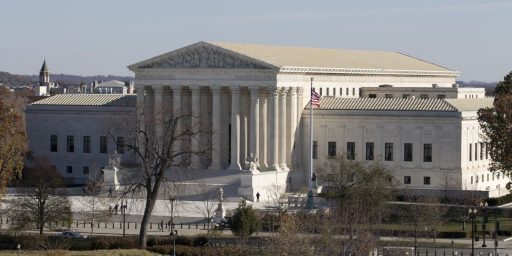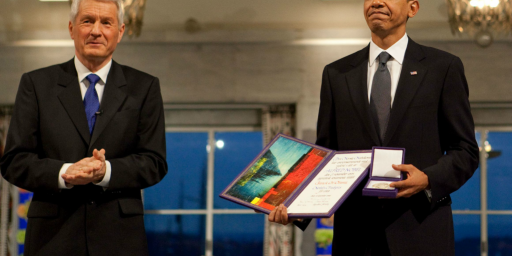Not With a Bang But a Whimper (In the Press)
Writing for Slate, Tim Noah nails exactly why the possible destruction of the Earth later this year when the Large Hadron Collider is switched on isn’t getting much attention in the press:
I can well understand why the Times doesn’t want to give sustained big play to the possibility that the world will end on or around Labor Day. In addition to the civic-minded concern that this might create worldwide panic, there are practical matters of self-interest. If the possibility weren’t realized, as most scientists seem to expect, then the Times would look foolish. If the possibility were realized, it would have no opportunity to collect a Pulitzer, because the Times, the Pulitzer board, the Columbia University Graduate School of Journalism, which gives out the award, and every last Times reader would all be obliterated, along with the rest of the planet.
Makes sense to me.






Apparently, spreading the global warming myth was enough of a lesson of the consequences of being dead wrong on predictions of world-wide calamity.
That giant sucking sound won’t be jobs going to Mexico as Ross Perot thought, but all the matter on earth falling into a black hole.
If there were a way to exploit it to further transnationalism or a progressive agenda, I think they would probably write about it. Alas, there’s way too much math for them to take this on.
A few years back Lawrence Livermore reduced the temperature of a vessel closer to absolute zero than is thought to exist anywhere due to background radiation. When you create something in physics that doesn’t exist you really don’t know what will happen or it wouldn’t be an experiment.
Then again Spielberg and Lucas recently created the highest budget to quality ratio of any movie in history with Indiana Jones and no one died (as far as I know).
I’d chalk it up more to the press having absolutely no idea how any of it works, or even being able to jumple enough physics terminology together to produce a readable article.
Well, the good news is that this thing might resolve the Fermi paradox. The bad news is that if it does, nobody will survive who knows the answer.
Thus the paradox will live on in other pre-Hadron Collider civilizations.
Doess this mean I can risk not filing my quarterly income taxes?
I believe the experiment was really conducted last week — Thursday, I think.
This simulation will terminate in 1024 seconds.
End msg.
Since turning the LHC on and conducting experiments on black holes and the Higgs Baryon is virtually unstoppable now, a campaign to publicize the event to a mass audience as a possible EOTW action would have only one point: to scare the public.
Meanwhile, thousands of scientists around the world are waiting with great anticipation to hear the results of these experiments. The contribution to physics if they are successful with the LHC experiments is enormous, and those scientists that investigated the possibility of EOTW convinced themselves that while possible, the probability of an EOTW outcome was something like .0000067. Finite, yes, but hardly alarming.
Let us bet on the success of the experiments. Might as well…
Pedant alert:
Uh, isn’t that the Higgs Boson?
It reminds me of the urban legend that our early nuclear scientists thought that the first atom bomb would ignite the atmosphere. It’s true that the possibility was brought up, but again it was proven to be an unsubstantiated concern _before_ the test. But even still, some people still believe that they didn’t know it was safe (well, as safe as a radioactive kiloton bomb can be).
Yes, but trying to keep track of your bosons and baryons is a bit like trying to put all your fermions in one quantum state. (Warning, nerd humor).
isn’t the warning supposed to sound BEFORE the explosion occurrs?
It was, but do to the gravity of the humor, it was a bit time-dilated in it’s arrival.